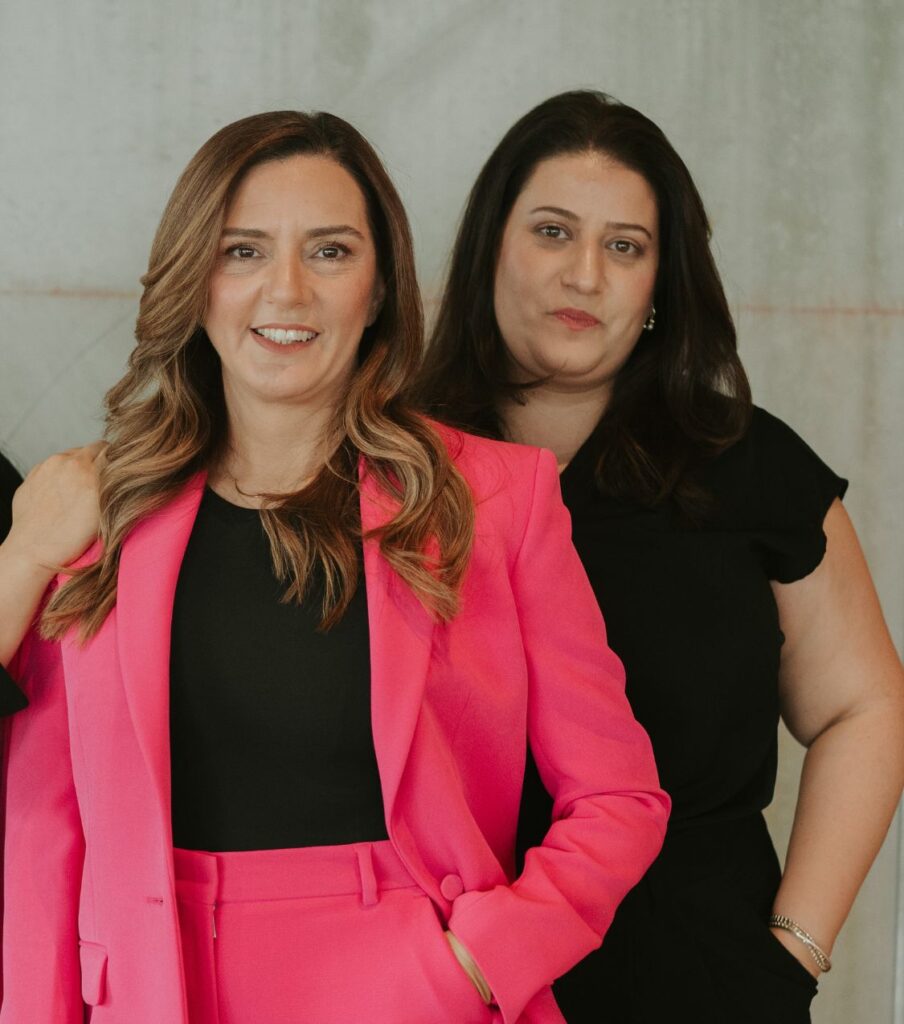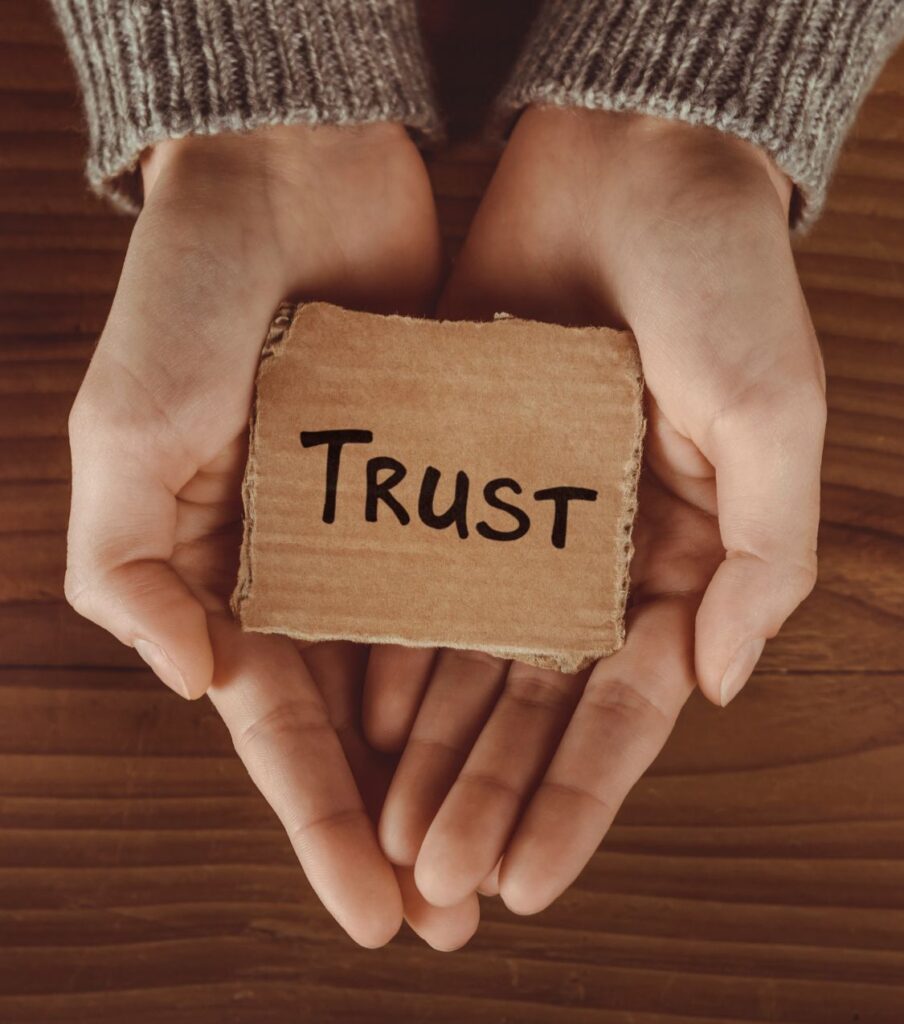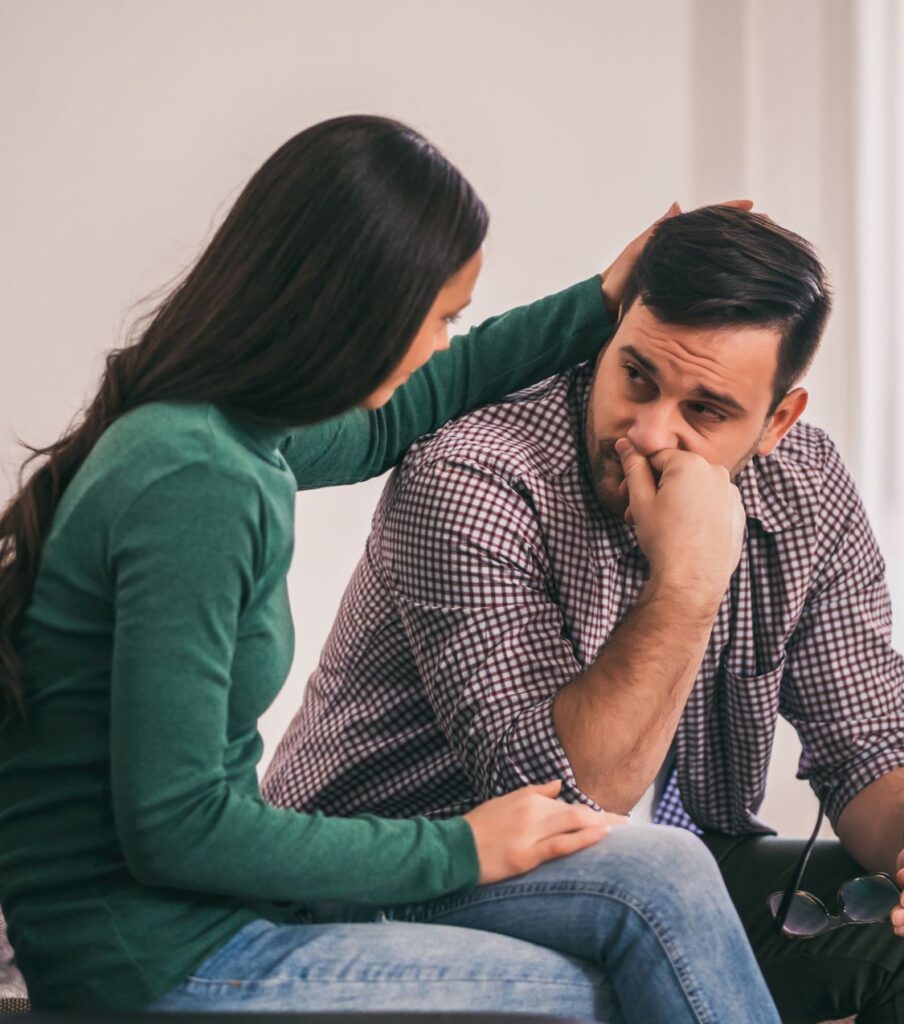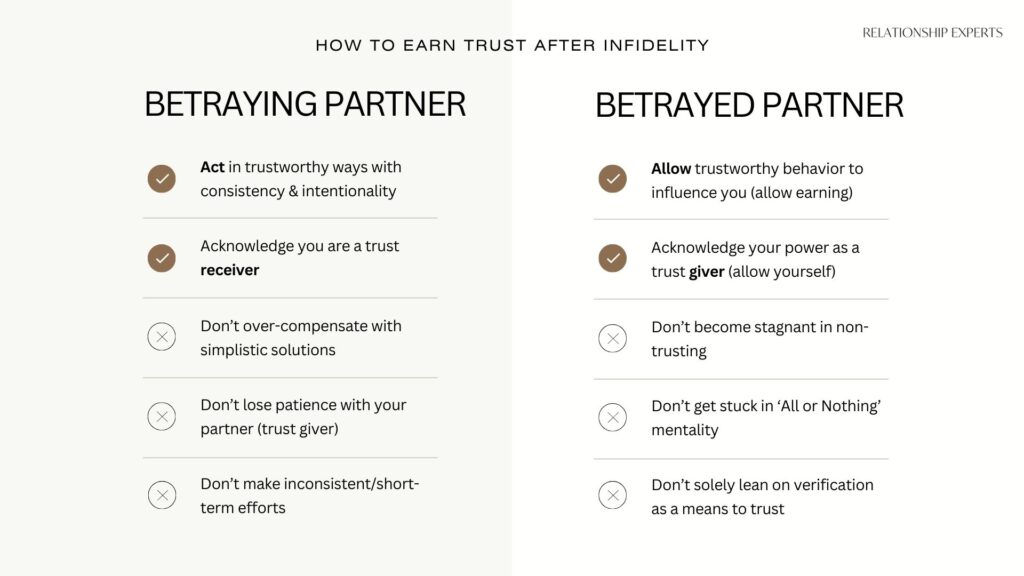If you and your partner are navigating affair recovery, you are most likely navigating how to rebuild trust after infidelity. To be more precise, you are navigating how to earn back the trust lost in your relationship.

In my work with couples in the aftermath of infidelity, trust remains a central concept. Its loss and the need to re-establish are integral parts of the healing journey.
In previous podcasts, blog posts, and conversations, we’ve discussed the ideas of blind trust versus open-eyed trust. I first learned these concepts from my mentors early in my training. Since then, I’ve continued to develop these ideas through my work with couples healing from infidelity.
For this discussion, I thought we’d dive deeper into the last link in the chain of lost trust: re-establishing it.
Like many others, I once referred to this phase as “rebuilding trust.” That is until I read an article that gave attempts to regain trust a better name and understanding of human behavior.
I invited one of my team members at Relationship Experts to discuss and explore this with me. Dr. Yael Haklai-Neagu is one of our lead therapists and someone I trust with trust as a concept in relationships.
Dr. Yael and I dove in together to provide our take as therapists and affair recovery experts on rebuilding trust vs. earning trust in the aftermath of infidelity. At first, we took time to challenge some conventional beliefs and, as always, offer our tips for moving forward.
Rebuilding vs. Earning: Trust After Infidelity
To begin, I must share that I subscribe to an amazing newsletter by Rachel Botsman. Who is Rachel Botsman? Let’s call her a “conventional thought disruptor.” Essentially, she challenges conventional thinking about trust in the corporate world. She is the well-known author of two critically acclaimed books, presenter of 3 highly successful TED Talks, and creator of a course on trust for Oxford University.
Recently, I got one of Rachel’s subscriber emails. It said: “Why building trust is a myth that needs busting”. It took me exactly zero seconds to open it. I clicked the “Read More” link and began reading an excellent, mind-shifting article that had me thinking – “my listeners need to know about this.”
My team agreed that the information in that article should be explored in depth. Dr. Yael was the first team member that came to mind as we have had similar discussions for years.
For ages, we’ve been exploring with our clients how trust (much like forgiveness) needs to be earned, not given, in the aftermath of infidelity. Now, we want to add another critical layer: trust needs to be earned, not rebuilt.
Let us explain why.
What’s the Difference Between Building Trust & Earning Trust?
What’s the big deal here? Why the distinction?

In her article, Rachel Botsman claims that the term ’building trust’ suggests it is a one-way street. The power lies within the person deserving of that trust. Earning trust, as she sees it (and we wholeheartedly agree), suggests something different. Trust is not one-sided. Instead, it is a two-way street or a collaborative effort. This suggests that the power lies within the person giving the trust.
With this in mind, I asked Dr. Yael her thoughts on the matter.
“Building trust is such a common phrase…. What is the difference?”
Dr. Yael: The difference between the phrases ‘building trust’ and ‘earning trust’ is crucial in the process of healing after infidelity. I realized after reading Rachel Botsman’s article that when we say ‘building trust,’ it implies that trust should automatically exist, almost as if it’s a given right after a breach of trust. Potentially, this can put pressure on the hurt partner to trust again without acknowledging the necessary effort from the unfaithful partner.
‘Earning trust,’ on the other hand, highlights the active and ongoing effort the unfaithful partner needs to put into regaining it. It acknowledges that trust isn’t an assumed right but something that needs to be diligently worked for by the person who broke it.
I believe that this shift in language sets more realistic expectations in the healing process, emphasizing the responsibility of the unfaithful partner to invest time and effort into re-establishing trust.
Exploring the Roles of Giver Vs. Receiver
For my part, I thought it would be interesting to highlight the difference between the two people connected in this trust journey: the Giver and the Receiver. Botsman explains it this way:
“To understand why trust and power are so intrinsically linked, it’s crucial to be aware of two key roles in any trust dynamic:
- Trust Giver: The individual deciding whether to trust someone or not.
- Trust Receiver: The individual who wants or needs another person’s trust.
Translated into the language of infidelity, we see the hurt partner/betrayed (HP) as the Giver and the unfaithful partner/betrayer (UP) as the Receiver.
Botsman notes, “It’s always up to the giver to choose whether to give someone their trust. The receiver must always earn it. Who has the power? Yes, the trust giver”.
At this point, I wondered if Dr. Yael could explain more about this dynamic:
What comes to mind as you think of Trust Giver Vs. Trust Receiver work with couples in the aftermath of infidelity?
Dr. Yael: You might be surprised, but the first thing that comes to my mind is the initial chaos when both partners are lost about how to start healing.

The hurt partner feels shock, pain, and an overwhelming sense of betrayal. They think they can never trust their partner again. Meanwhile, the unfaithful partner is dealing with the consequences. They’re desperate to regain the trust they shattered, often drowning in guilt and the desire to be seen as trustworthy.
In this messy initial stage, there is this crucial distinction between the Giver and the Receiver of Trust. It’s like a roadmap in the chaos, indicating the roles each partner needs to play in the healing process. It’s a bit like the shift from ‘building trust’ to ‘earning trust.’ It’s a whole different approach.
Talking about the ‘Giver’ and ‘Receiver’ of trust highlights the difficult but crucial journey both partners need to navigate to heal.
Together, we explored the following examples of the ‘Giver’ and ‘Receiver’ process.
Entitlement Gets In The Way of Trust and Healing
Dr. Yael: If the unfaithful partner assumes they automatically deserve the hurt partner’s trust, simply because they’re physically present or apologized, without recognizing the need to actively invest in earning it, it can also hinder the healing process.
Idit: Yes, the unfaithful partner is on the receiving end of the trust. This means they need to do something to earn it. There cannot be any sense of entitlement that obligates the other partner to begin trusting them. Can you give another example of this and talk about the role of the hurt partner as a giver of trust?
Unyielding Rejection Prevents Earned Trust and Healing
Dr. Yael: When the hurt partner refuses to offer any chance for their partner to earn back trust – stating something like, “It doesn’t matter what you’re going to do, I will never trust you” – it closes the door to any possibility of healing.
While it’s completely valid for the hurt partner to mistrust and doubt their partner after experiencing betrayal, this kind of statement sets a roadblock in the path towards healing. It shuts down any opportunity for the unfaithful partner to demonstrate growth, change, and genuine efforts to regain trust.
So, if we think about both the giver and the receiver, both partners must recognize that the path to healing involves willingness and effort from both sides. Like you said earlier, Idit, it’s a collaborative effort.
What’s the Difference Between Trust as Belief vs. Trust as Behavior?
One of the most important takeaways from this discussion? There is a way to earn trust.
We live with the understanding that trust is an abstract thing. It either exists or doesn’t. Couples in the aftermath of infidelity attest that they trusted their partner before the infidelity, not realizing that the trust they enjoyed was either earned through trustworthy behavior or given blindly, not earned at all.

I sometimes ask my clients if they would buy an expensive computer from a company they know little about. Everyone says, “Of course not”. Apple had to work hard to earn our trust. Otherwise, we’d be unwilling to pay double for their computers. Thus, Apple acts in trustworthy ways. They provide excellent and consistent customer support. If you have an issue, you know it will be fixed because it is consistently handled this way.
What about people in relationships? What about those who broke the trust they were given? How can they earn it back? It’s not by hoping time will regain it for them. It is also not by offering one-time solutions that are inconsistent over time.
Again, Rachel Botsman says, “You have the power to be trustworthy. Trust is a belief we can’t control. Trustworthiness is a behavior we can control through our decisions, values, and choices.”
Dr. Yael agrees, “Don’t focus on building trust because you cannot control someone else’s trust. Focus on yourself instead and act in trustworthy ways.”
Trust and earning trust is like the difference between love and acting in loving ways. One is the abstract term. The other is the behavior that creates and sustains it.
So, What Does Being Worthy of Someone’s Trust Depend On?
According to Botsman, three things must occur:
- How we treat people daily, especially when things are not going well.
- How we communicate and set expectations.
- What we decide to do – but equally important, what we decide NOT to do.
One of Bostman’s most powerful quotes says it all, “We all have the power to be trustworthy, but we’re still dependent on others to give their trust.”
What does that mean for couples in the aftermath of infidelity?
- The Unfaithful Partner (UP) needs to know they have the power to act in trustworthy ways, but it doesn’t entitle them to their partner’s trust.
- The Hurt Partner (HP) has the power to give their trust.
Trust a two-way street!
With that established, I asked Dr. Yael for some practical tips.
How Can One Act in Trustworthy Ways in the Aftermath of Infidelity?
3 Basic Tips to Earn Trust
- Transparency: Being open and honest is crucial. When providing information, don’t wait for your partner to find out. Be forthcoming. ”Trickle truths” and gaslighting hurt more than the full truth.
- Accountability: Take responsibility for actions, acknowledge the damage caused, and initiate conversations about it. Don’t wait for your partner to bring it up.
- Consistency: Demonstrate consistency in behavior and genuine actions. This includes following through on promises and commitment. Make a sustained effort to rebuild what was broken.
Do’s & Don’ts for Earning Trust
Given all we’ve discussed, it means nothing if you cannot apply it. So, let’s go over tips for couples who want to earn trust in the aftermath of infidelity. We created this table for you.

Hopefully, earning trust after infidelity feels clearer to you now. My team and I find that this distinction is helpful with our affair recovery program clients.
NEXT STEPS
Please consider our Infidelity Recovery Program as a path toward learning to earn and give trust again. Consider the following options for rebuilding your relationship below.
- Learn about our Affair Recovery Program and what we offer.
- Read the reviews and testimonials of our clients who finished our program.
- Schedule a free 45-minute consultation, receive more information, and start healing immediately!
We hope this information is helpful and valuable to you. Thank you for taking the time to get informed!
LISTEN ON THE PODCAST
Watch This Episode on YouTube
Links Mentioned in this Episode
Rachel Botsman’s website
The Rethink With Rachel newsletter
Episode #033: where I discuss blind trust vs. opened-eye trust:
Comments +